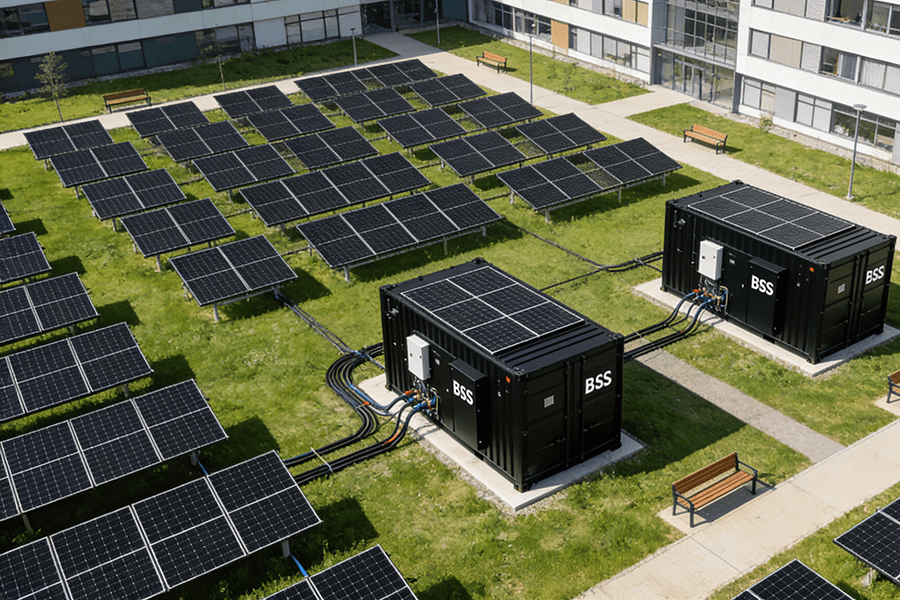Solar Carport Commercial : A Comprehensive Guide
As businesses increasingly embrace green energy, commercial solar carports have become an excellent solution for generating electricity, supporting electric vehicle (EV) charging, and improving sustainability. In this guide, we will delve into the details of commercial solar carports, including power requirements, carport dimensions, energy output, and more.

Car Charging Power Requirements
The charging power for electric vehicles (EVs) depends on the type of charger used, which significantly impacts the design of your solar carport.
- Level 1 Charging (Slow):
- Power: 1.4 kW (120V residential outlet)
- Charging Time: 8–12 hours to fully charge an EV
- Use Case: Typically not used in commercial carports due to slow charging speeds.
- Level 2 Charging (Fast):
- Power: 3.3 kW to 19.2 kW (240V)
- Charging Time: 2–6 hours to fully charge an EV
- Use Case: The most common charging type for commercial installations.
- Example: A 7 kW charger can fully charge a typical EV in 4-6 hours.
- DC Fast Charging (Level 3):
- Power: 50 kW to 250 kW
- Charging Time: 30 minutes to 1 hour to charge 80% of the EV battery
- Use Case: Ideal for high-traffic areas or highway charging stations.
- Example: A 150 kW DC fast charger can provide 80% charge for an EV in 30 minutes, which is suitable for a busy commercial parking lot.
Carport Size and Power Output
The size of your solar carport directly impacts how many vehicles it can charge, as well as its energy production.
- Typical Carport Size:
- For 2–4 vehicles: 50–70 m²
- For 20 vehicles: 300–500 m²
- Large commercial setups can extend up to 1000 m² for 50+ vehicles.
- Power Output:
- A 10 kW solar system can generate 40-50 kWh/day on average.
- Example: This can charge 2-4 vehicles (Level 2 chargers) for a full day of operation, depending on usage.
- A 20 kW solar system can generate 80-100 kWh/day.
- Example: With this system, up to 10-12 EVs could be charged per day, depending on the type of charger used.
- A 10 kW solar system can generate 40-50 kWh/day on average.
Large-Scale Solar Carport Planning: Key Considerations
When planning for large-scale commercial solar carports, several important factors should be considered:
- Structural Design:
- The strength of the carport structure must support the weight of solar panels, wiring, and EV chargers.
- Example: A 500 m² carport with a 50 kW solar system will need to support 200+ solar panels, each weighing around 20 kg (4000 kg total).
- Panel Layout:
- The solar panels must be oriented to maximize sunlight exposure.
- If the location receives 4 hours of sun per day, a 10 kW system could generate 40–50 kWh per day.
- Example: A 20 kW system would require around 80-100 panels and generate 80-100 kWh/day, covering the charging needs of 8–12 EVs.
- Energy Distribution:
- It’s crucial to balance the power between EV chargers and other commercial needs (lighting, HVAC, etc.). A 20 kW system could cover 70% of an office building’s energy needs, leaving 30% for EV charging.
Waterproofing and Other Key Considerations
Proper waterproofing is essential for the longevity and safety of your solar carport:
- Roof Waterproofing:
- Carports should use weather-resistant steel or polycarbonate roofing to prevent leaks.
- Example: A metal carport can withstand wind speeds of up to 150 km/h and heavy rain without compromising the panels.
- Cable Protection:
- Use waterproof cables to prevent damage from rain and humidity. All external connections must be sealed to avoid electrical faults.
- Example: IP65-rated cables are designed to resist dust and water.
- Drainage:
- Proper drainage should be incorporated into the carport’s design to prevent pooling of water. A drainage system with sloped roofing ensures water runs off easily.
Cost Estimation
The cost of installing a solar carport can vary depending on factors such as size, system capacity, and location. Below are general cost estimates:
- Small Carport (10 kW system): Estimated cost between €50,000 – €75,000.
- Medium Carport (20 kW system): Estimated cost between €100,000 – €150,000.
- Large Carport (100 kW system): Estimated cost between €300,000 – €500,000.
These costs include installation, materials, and the solar system components. However, businesses can benefit from various government incentives and tax credits, which can significantly reduce initial investments.
Cost Estimation for Commercial Solar Carports
The total cost of installing a solar carport depends on several factors, including system size, complexity, and location.
- Cost per Carport:
- Small carports (2–4 vehicles): €50,000 – €100,000 for a 10 kW system.
- Medium carports (10–20 vehicles): €100,000 – €250,000 for a 20–50 kW system.
- Large carports (50+ vehicles): €250,000 – €500,000 for a 100+ kW system.
- Energy Savings:
- Example: A 10 kW system saving €0.10 per kWh can save €4,000–€5,000 annually on electricity costs.
- Example: A 20 kW system can save €8,000–€10,000 annually.
- Return on Investment (ROI):
- For smaller carports (10–20 kW), businesses can expect ROI within 5–7 years depending on energy costs and government incentives.
- Example: With an initial investment of €200,000, a commercial site could see ROI within 7 years, assuming annual savings of €25,000.
Maintenance and Long-Term Management
Regular maintenance is vital for ensuring the efficiency and longevity of your solar carport:
- Panel Cleaning:
- Solar panels should be cleaned at least twice a year to maintain 90% efficiency.
- Example: If a 20 kW system generates 80 kWh/day, cleaning can improve daily output by up to 10 kWh.
- Electrical Inspections:
- Regular inspections of wiring, inverters, and charging stations should be done every 6–12 months to ensure safe operation.
- System Monitoring:
- Example: Real-time monitoring can alert you to underperforming panels or faults in the system, helping to optimize energy production.
By opting for a commercial solar carport, businesses not only contribute to sustainability but also significantly reduce energy costs. The integration of solar energy with electric vehicle charging is a future-forward solution that supports both eco-friendly goals and operational efficiency. With proper planning, installation, and maintenance, commercial solar carports can provide long-term, reliable benefits.
At Maxbo, we specialize in providing customized solar carport solutions that meet the specific needs of your commercial space, ensuring that you get the most efficient and cost-effective solar energy system possible.
Website: www.maxbo-solar.com
Email: [email protected]
Solar System Price for Home Solar System Price for Home Solar System Price for Home Solar System Price for Home Solar System Price for Home Solar System Price for Home Solar System Price for Home Solar System Price for Home Solar System Price for Hom
Solar System Price for Home Solar System Price for Home Solar System Price for Home Solar System Price for Home Solar System Price for Home Solar System Price for Home Solar System Price for Home Solar System Price for Home






